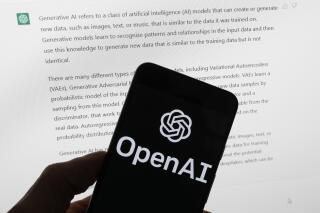Biden administration seeks input on AI safety measures

FILE - The OpenAI logo is seen on a mobile phone in front of a computer screen displaying output from ChatGPT, Tuesday, March 21, 2023, in Boston. President Joe Biden’s administration wants stronger measures to test the safety of artificial intelligence tools such as ChatGPT before they are publicly released, though it hasn’t decided if the government will have a role in doing the vetting. The U.S. Commerce Department on Tuesday, April 11, said it will spend the next 60 days fielding opinions on the possibility of AI audits, risk assessments and other measures that could ease consumer concerns about these new systems. (AP Photo/Michael Dwyer, File)
President Joe Biden’s administration wants stronger measures to test the safety of artificial intelligence tools such as ChatGPT before they are publicly released, though it hasn’t decided if the government will have a role in doing the vetting.
The U.S. Commerce Department on Tuesday said it will spend the next 60 days fielding opinions on the possibility of AI audits, risk assessments and other measures that could ease consumer concerns about these new systems.
“There is a heightened level of concern now, given the pace of innovation, that it needs to happen responsibly,” said Assistant Commerce Secretary Alan Davidson, administrator of the National Telecommunications and Information Administration.
The NTIA, more of an adviser than a regulator, is seeking feedback about what policies could make commercial AI tools more accountable.
Biden last week said during a meeting with his council of science and technology advisers that tech companies must ensure their products are safe before releasing them to the public.
The Biden administration also last year unveiled a set of far-reaching goals aimed at averting harms caused by the rise of AI systems, but that was before the release of ChatGPT, from San Francisco startup OpenAI, and similar products from Microsoft and Google led to wider awareness of the capabilities of the latest AI tools that can generate human-like passages of text, as well as new images and video.
“These new language models, for example, are really powerful and they do have the potential to generate real harm,” Davidson said in an interview. “We think that these accountability mechanisms could truly help by providing greater trust in the innovation that’s happening.”
The NTIA’s notice leans heavily on requesting comment about “self-regulatory” measures that the companies that build the technology would be likely to lead. That’s a contrast to the European Union, where lawmakers this month are negotiating the passage of new laws that could set strict limits on AI tools depending on how high a risk they pose.
